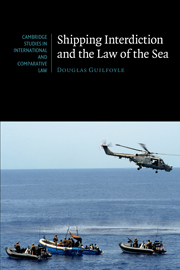Book contents
- Frontmatter
- Contents
- Foreword
- Preface
- Acknowledgements
- List of abbreviations
- Table of treaties and other international agreements
- Table of cases
- PART I General principles
- 1 Introduction: policing the oceans
- 2 Basic principles of maritime jurisdiction
- PART II Interdiction and maritime policing
- PART III The general law of interdiction
- Select bibliography
- Index
- CAMBRIDGE STUDIES IN INTERNATIONAL AND COMPARATIVE LAW
2 - Basic principles of maritime jurisdiction
Published online by Cambridge University Press: 11 September 2009
- Frontmatter
- Contents
- Foreword
- Preface
- Acknowledgements
- List of abbreviations
- Table of treaties and other international agreements
- Table of cases
- PART I General principles
- 1 Introduction: policing the oceans
- 2 Basic principles of maritime jurisdiction
- PART II Interdiction and maritime policing
- PART III The general law of interdiction
- Select bibliography
- Index
- CAMBRIDGE STUDIES IN INTERNATIONAL AND COMPARATIVE LAW
Summary
State jurisdiction over vessels at sea
This book principally examines situations where one state exercises jurisdiction over a vessel otherwise subject to the exclusive jurisdiction of a flag or coastal state. ‘Jurisdiction’ refers to a state's power ‘under international law to govern persons and property by its [national] law’ and to ‘make, apply, and enforce rules of conduct’ to that end. It is commonly held that
the first and foremost restriction imposed by international law upon a State is that – failing the existence of a permissive rule to the contrary – it may not exercise its power … in the territory of another State. … [Jurisdiction] cannot be exercised by a State outside its territory except by virtue of a permissive rule derived from international custom or from a convention.
State power applied beyond territorial limits seems exceptional, justifiable only by permissive rules or exceptions. The extraterritorial exercise of state jurisdiction over maritime areas and vessels at sea thus requires explanation. International law distinguishes between the scope of prescriptive and enforcement jurisdiction of national criminal law; ordinarily the latter is regarded as absolutely territorially constrained, while the former may extend extraterritorially in certain cases. A state may prohibit or regulate at least certain classes of extraterritorial conduct (‘prescriptive jurisdiction’) even where it has no authority to enforce that law outside its territory (‘enforcement jurisdiction’), such prescription being logically independent of enforcement.
- Type
- Chapter
- Information
- Shipping Interdiction and the Law of the Sea , pp. 7 - 20Publisher: Cambridge University PressPrint publication year: 2009
- 1
- Cited by



